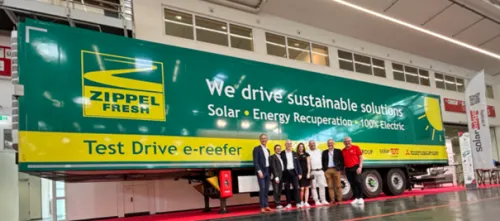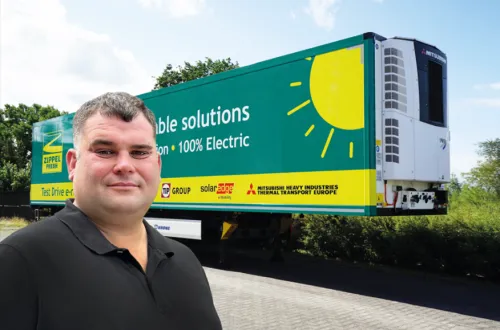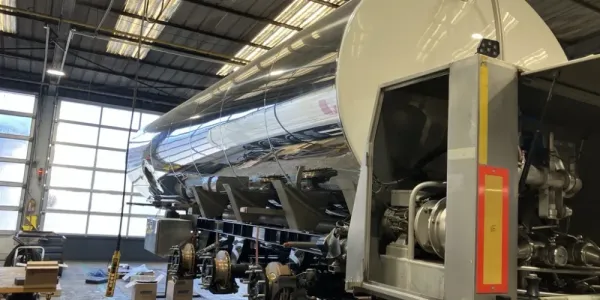The electric reefer solution that’s changing cold-chain economics
Can you actually cut costs while meeting sustainability targets without compromising your cold chain? Zippel Fresh just proved you can. Their six-month trial with TIP Group, Mitsubishi Heavy Industries Thermal Transport Europe GmbH and SolarEdge e-Mobility’s innovative e-reefer technology – the Powered Trailer with three energy sources (solar panels, battery storage, and brake energy recuperation) – is saving approximately 500 liters of diesel every month while demonstrating exactly what's possible when sustainable technology effortlessly integrates into daily operations.

The Partners at transport logistic 2025
From left: Rogier Laan (TIP Group), Pavel Gilman (SolarEdge e-Mobility), Axel Plaß, Melina Plaß (Zippel Fresh), Matthias Burmester (TIP Group), Christian Goetsch (Mitsubishi Heavy Industries Thermal Transport Europe GmbH), and Marcus Burmeister (TIP Group).
When German logistics company Zippel Fresh agreed to test an innovative electric refrigerated trailer earlier this year with TIP Group, the stakes were clear: maintain the unbroken cold chain that their perishable cargo demands, while evaluating whether the multi-energy reefer technology could deliver both operational and financial benefits.
The results? “The use of the e-reefer shows that sustainable technologies can be integrated into everyday life without compromising safety and reliability,” Dane Scheumann, branch manager at Zippel Fresh, shares. “There were no problems operating the electric refrigerated trailer safely and efficiently."
The numbers that matter to your bottom line
After six months of real-world operation, Zippel Fresh achieved:
- 500 liters of diesel savings monthly compared to conventional units
- Zero cold chain interruptions across all transports
- Reduced brake (pad and disc) maintenance costs through energy recuperation
- Seamless operation even at -28°C temperatures
- Positive customer reactions and enhanced brand positioning
Addressing operational concerns
Will it actually work in demanding conditions? Dane Scheumann, Zippel Fresh's branch manager, put the system through rigorous stress testing at temperatures as low as -28°C, including weekend standstills and long-distance trips on their 200-kilometer meat transport routes. Solar panels charge the system during daytime parking, while energy recuperation occurs during travel. When battery levels drop below predetermined thresholds, the system automatically activates its recuperation generator. “The various components interact in such a way that cooling is always guaranteed. There were no interruptions in the cold chain, and all transport went smoothly", reports Scheumann. "There were no interruptions in the cold chain, and all transport went smoothly," he adds. “The use of the e-reefer shows that sustainable technologies can be integrated into everyday life without compromising safety and reliability".
Is it too complex for our drivers? Scheumann deployed both trained and untrained drivers to evaluate system complexity. The verdict was decisive: "Even without prior instruction, there were no problems operating the electric refrigerated trailer safely and efficiently." The dashboard provides real-time battery performance data while telematics automatically report any issues, features that reduce operational complexity compared to conventional diesel units.
What about service support? Technical complexity demands reliable support infrastructure. When Zippel Fresh reported an afternoon malfunction, SolarEdge deployed a technician who arrived the following morning. "Honestly, I have never experienced such good service in this form," Scheumann says. This service responsiveness appears crucial for fleet adoption, as operators require confidence that technical issues won't disrupt customer commitments.

Dane Scheumann, branch manager at Zippel Fresh
The competitive advantage
Beyond cost savings, Scheumann reports brand benefit: "We often experience astonished looks when we drive onto the customer's premises with the solar trailer, and that fills our entire team with pride". In an industry where sustainability credentials increasingly influence contract decisions, this technology provides a clear differentiator.
Risk-free trial opportunity
"Through the rental model, we can integrate the e-reefer into our operations without risk and gain practical experience,” explains Scheumann. This approach allows operators to validate the technology's performance in their specific operating conditions before making larger fleet commitments.
Ready to explore your options?
Discover how TIP Group's e-reefer technology can reduce your fuel costs and enhance your competitive positioning. Our experts will assess your specific route profiles and operational requirements to determine the optimal implementation strategy.
- Learn more about TIP’s electric reefers: https://www.tip-group.com/en/fleet/e-reefer
- Get your e-reefer advice: https://www.tip-group.com/en/e-reefer-advice
- Connect with our experts: https://www.tip-group.com/en/e-reefer/contact-us



